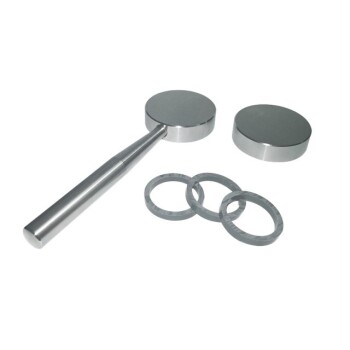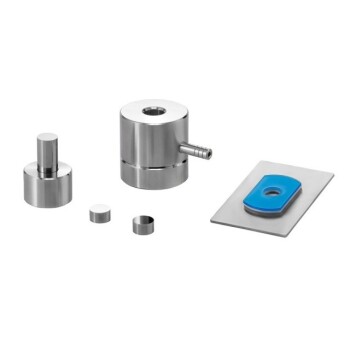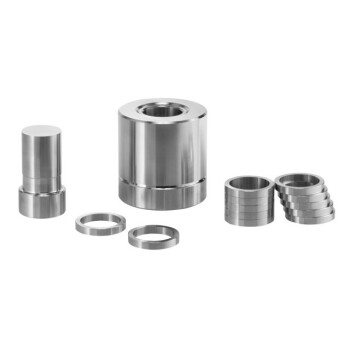In short, lab pellet presses are indispensable because they deliver a combination of precision, durability, customization, and expert support. These attributes work together to create uniform sample pellets, which is the foundational requirement for generating accurate and consistent analytical results in demanding laboratory environments.
The core challenge in many analytical techniques is not the instrument, but the sample itself. A lab pellet press directly solves this by transforming inconsistent powders into standardized, uniform pellets, thereby eliminating a major source of error and ensuring the reliability of your data.

The Core Function: Achieving Sample Uniformity
The primary value of a hydraulic pellet press is its ability to create identical samples, time after time. This consistency is not a minor convenience; it is the bedrock of reliable scientific analysis.
The Impact of Precision Control
Modern lab presses provide a high degree of precision. Features like calibrated pressure gauges and adjustable force settings allow the operator to apply a specific, repeatable amount of pressure.
This control ensures that every pellet has the same density, thickness, and surface finish, which is critical for techniques like X-Ray Fluorescence (XRF) and Fourier-Transform Infrared (FTIR) spectroscopy.
Ensuring Consistency Across Batches
By removing the variability inherent in manual sample preparation, a pellet press guarantees consistency across different samples and different users.
This is essential for long-term studies or quality control processes where results must be comparable over weeks, months, or even years.
Versatility for Diverse Applications
These presses are not one-trick ponies. They are designed for versatility to handle a wide range of materials and research needs.
With compressive forces ranging from 15 to over 100 tons and optional heated platens reaching up to 1200°F (approx. 650°C), they can process polymers, ceramics, and other challenging materials for advanced characterization.
Built for the Rigors of Laboratory Use
A lab press is an investment in long-term capability. Its design focuses on reliability and adaptability to ensure it remains a valuable asset for years.
Robust and Durable Construction
These machines are built to withstand the immense forces they generate. Their durability means they can perform reliably under continuous use in high-throughput academic, industrial, and research settings.
Customization for Specific Needs
Laboratories have unique constraints and workflows. Pellet presses can be specified as compact benchtop models for smaller spaces or larger floor units for higher force requirements.
This customization ensures the equipment fits the lab's specific application and physical footprint, not the other way around.
The Value of Expert Support
Reputable manufacturers provide expert support and service. This access to technical knowledge ensures maximum uptime, assists with application development, and helps labs get the most out of their investment.
Understanding the Trade-offs and Best Practices
While incredibly powerful, a pellet press is a precision instrument that requires proper care to deliver on its promise of accuracy. Ignoring this reality is a common pitfall.
The Requirement for Regular Maintenance
Optimal performance depends on routine care. Best practices include regularly cleaning and lubricating all moving parts and periodically replacing hydraulic fluids.
Failing to perform this maintenance can lead to inconsistent pressure application and premature wear, undermining the very precision the press was designed to provide.
The Necessity of Calibration
The pressure gauge is the heart of the press's accuracy. This gauge must be calibrated on a regular schedule to ensure the force you set is the force being delivered.
Without proper calibration, you are operating on an assumption of accuracy, which introduces a significant potential for error into your sample preparation.
The Human Factor: Operator Skill
The most advanced press cannot compensate for poor technique. The operator must be trained on proper die assembly, sample loading, pressure application, and cleaning protocols to achieve truly uniform pellets.
Making the Right Choice for Your Goal
To select and use a press effectively, align its capabilities with your primary analytical objective.
- If your primary focus is analytical accuracy: The key benefit is the press's precision control, which creates perfectly uniform pellets to eliminate sample-to-sample variance in spectroscopic analysis.
- If your primary focus is material characterization: The key benefits are the high force capacity and optional heated platens, which allow you to form and test a wide variety of materials under specific conditions.
- If your primary focus is long-term reliability and throughput: The key benefits are the robust construction and routine maintenance procedures that ensure consistent performance over years of heavy use.
Ultimately, mastering consistent sample preparation with a quality pellet press is the first and most critical step toward generating scientific data you can trust.
Summary Table:
| Benefit | Description |
|---|---|
| Precision Control | Enables repeatable pressure for uniform density and thickness in pellets. |
| Consistency | Eliminates sample variability for reliable, long-term analytical results. |
| Versatility | Handles various materials with force up to 100 tons and heated platens to 1200°F. |
| Durability | Built for continuous use in high-throughput lab environments. |
| Customization | Offers benchtop or floor models to fit specific lab needs and spaces. |
| Expert Support | Provides technical assistance for maintenance and application optimization. |
Ready to enhance your lab's accuracy and efficiency with a reliable pellet press? KINTEK specializes in lab press machines, including automatic lab presses, isostatic presses, and heated lab presses, designed to deliver precise sample preparation for techniques like XRF and FTIR. Our expert support ensures you get the most out of your investment with customized solutions for your laboratory needs. Contact us today to discuss how we can help you achieve consistent, high-quality results!
Visual Guide

Related Products
- Laboratory Hydraulic Press 2T Lab Pellet Press for KBR FTIR
- Automatic Laboratory Hydraulic Press Lab Pellet Press Machine
- Laboratory Hydraulic Press Lab Pellet Press Button Battery Press
- Laboratory Hydraulic Pellet Press for XRF KBR FTIR Lab Press
- Manual Laboratory Hydraulic Press Lab Pellet Press
People Also Ask
- How is a laboratory hydraulic press used for polymer melt crystallization? Achieve Flawless Sample Standardization
- What is the role of a hydraulic press in KBr pellet preparation for FTIR? Achieve High-Resolution Chemical Insights
- What role does a high-pressure laboratory hydraulic press play in KBr pellet preparation? Optimize FTIR Accuracy
- How is a laboratory hydraulic press used for Tb(III)-Organic Framework FT-IR samples? Expert Pellet Pressing Guide
- What are some laboratory applications of hydraulic presses? Boost Precision in Sample Prep and Testing



















